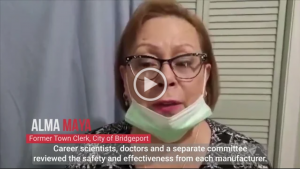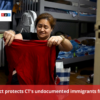------> Watch the Full Video Here<-------
BRIDGEPORT — Whether through work or in his personal life, Samuel Diaz III has heard all of the myths and falsehoods people cite for not getting vaccinated against the coronavirus.
“Oh — the microchip,” Diaz, chief strategy officer for Southwest Community Health Center, said, rattling off a list that included the untrue claim recipients are implanted with a tracker. “That one isn’t so active anymore.”
Still, Diaz and other prominent Hispanic leaders know there is still plenty of fear and skepticism in that community about the shots and have launched a new online, bilingual public service advertisement to whittle away reasons the holdouts have for avoiding the vaccines.
“I think that the majority of the people who said, ‘I’m gonna do it,’ they did it,” said Eddie Martinez, president of the Greater Bridgeport Latino Network. “The people who are hesitant are those who are just not informed or (have) too much information, not knowing which is true, which isn’t.”
Martinez, Diaz and others are featured in the nearly five-minute video, released late last week, which seeks to debunk several pieces of misinformation about the COVID-19 shots.
“I’m here to call foul on the myth that vaccines are not safe,” says John Torres, director of the Bridgeport Caribe Youth Leaders, into the camera. “Trials with more than 70,000 people have shown that both vaccines are safe and effective.”
Alma Maya, the city’s former town clerk and a Democratic activist who, along with her household, battled COVID last fall, is also featured.
“I assure you, you do not want that for your loved ones,” Maya says in the video of her family’s experience. “I reject the rumor that the vaccine was developed too fast. Actually, no shortcuts were taken when developing the vaccines.”
In addition to his duties with Southwest Community Health Center, Martinez is an instructor at his family’s Shotokan Karate School in Stratford. In fact, he appears in the video at the school, letting viewers know it is “impossible” to catch coronavirus from the vaccines.
Nurse Jessica Alicea-Planas, who teaches at Fairfield University; Frankie Colon, head of the Puerto Rican Day Parade, and Clodomiro Falcon, who runs the Hispanic Chamber of Commerce, also each take a turn sharing information.
Martinez said those in the advertisement are “people who have been known a long time in the community and are trusted by many.”
This type of community outreach is hardly novel. For months, Black and Hispanic leaders, including heads of churches and elected officials, have been trying to overcome suspicion in those communities. Beside the misinformation that can be found on cable television or social media, vaccination advocates must also grapple with the medical professions’ prior use of minorities as test subjects.











